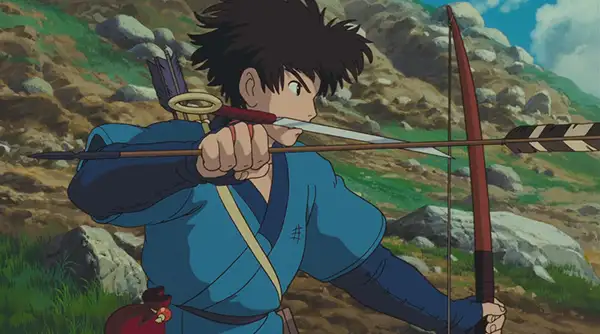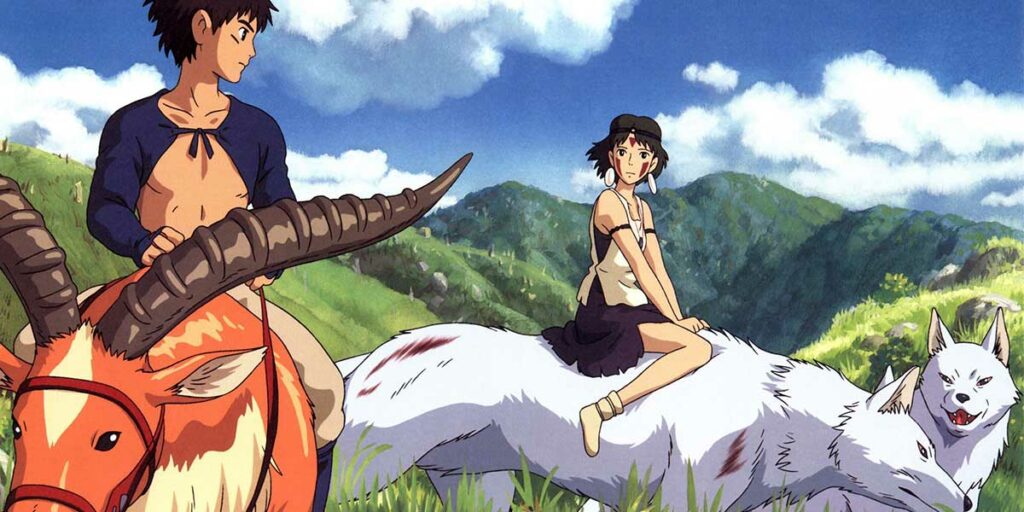Blending gorgeous visuals with a tender and topical narrative that speaks to the soul, Princess Mononoke is one of Ghibli’s most important films yet.
Studio Ghibli is a production company best known for its lighthearted, child-friendly stories that often hold deeper messages relating to the world around us. More iconic works like Spirited Away and My Neighbor Totoro make light work of themes such as family and friendship, but Princess Mononoke remains one of Ghibli’s most underrated projects despite the importance of its story. The film is widely celebrated for its beautiful visuals – which contain what are still some of the most striking designs ever used in film – but the narrative doesn’t get nearly enough credit for its forward-thinking commentary on humanity, nature, and the omnipresent conflict between the two.
Princess Mononoke follows the exploits of a young boy named Ashitaka (Yōji Matsuda), who finds himself inflicted with a deadly curse after his village is attacked by a demonic creature. In order to protect the community around him, and hopefully cure himself in the process, Ashitaka sets out on a dangerous journey to defeat the beast – but ends up caught in the middle of a conflict between a nearby village and the mythical wildlife of the forest.
The film begins just like any typical adventure story: Ashitaka is given a mission to save himself and sets out on a perilous journey to complete it. But Princess Mononoke quickly flips the script and presents audiences with something much more complex and subversive that doesn’t follow the conventions of the genre at all – and that’s where the film shines.
At its heart, Princess Mononoke is a story about the importance of protecting the world around us. The conflict between humans and nature is presented as something almost inevitable, but Ashitaka is a well-rounded character that helps explain to the audience how these two communities can actually live in harmony despite their diametrically opposed lives. It’s the kind of narrative that’s vital to introduce to young audiences, and hiding these messages behind the glossy facade of a family adventure is an area where Studio Ghibli and director Hayao Miyazaki have always been way ahead of the curve. Princess Mononoke is actually much darker and more violent than many Ghibli projects, but that dreamlike haze is still there to keep the facade of innocence running throughout.

As a style of filmmaking, animation probably has the most creative freedom of them all – and Princess Mononoke fully capitalises on that. The boundless scope of this narrative is consistently enhanced by the magical creature designs, dynamic action sequences, and emotive character work that simply wouldn’t have been possible in live-action. It’s easy to dismiss animated movies as children’s stories, but Studio Ghibli has always proven that the two aren’t always bound to one another. This is a story for everybody, with the power of the human spirit and natural wonder binding all audiences together.
Princess Mononoke also has some of the most compelling and intriguing characters in Ghibli’s catalogue: Ashitaka is a fascinating protagonist who essentially serves as a liaison between the humans and animals, allowing Miyazaki to tell this story from a unique perspective that allows the audience to relate to both sides. His emotional journey is plotted expertly, taking the viewer on a real adventure that culminates in some unexpectedly passionate and overwhelming moments. The titular Princess Mononoke (Yuriko Ishida) also has plenty of memorable scenes, and her ambiguous position within the conflict really keeps audiences guessing from beginning to end. The entire film is just a confident display of Miyazaki’s storytelling prowess – he knows exactly how to write these characters and their interactions in a way that’s constantly evolving, and always with purpose.
This all comes together to make Princess Mononoke, if not Studio Ghibli’s best movie, arguably its most underrated. Other stories might have stronger entertainment value or more relatable characters, but Princess Mononoke is essentially the platonic ideal of what makes this style of filmmaking so great. It’s a fine-tuned adventure story that uses its gripping narrative to convey an important message, to the extent that watching this film genuinely feels like learning something about the world around us.
Princess Mononoke is now available to watch on digital and on demand. Read our reviews of Spirited Away, The Boy and the Heron and Howl’s Moving Castle.

